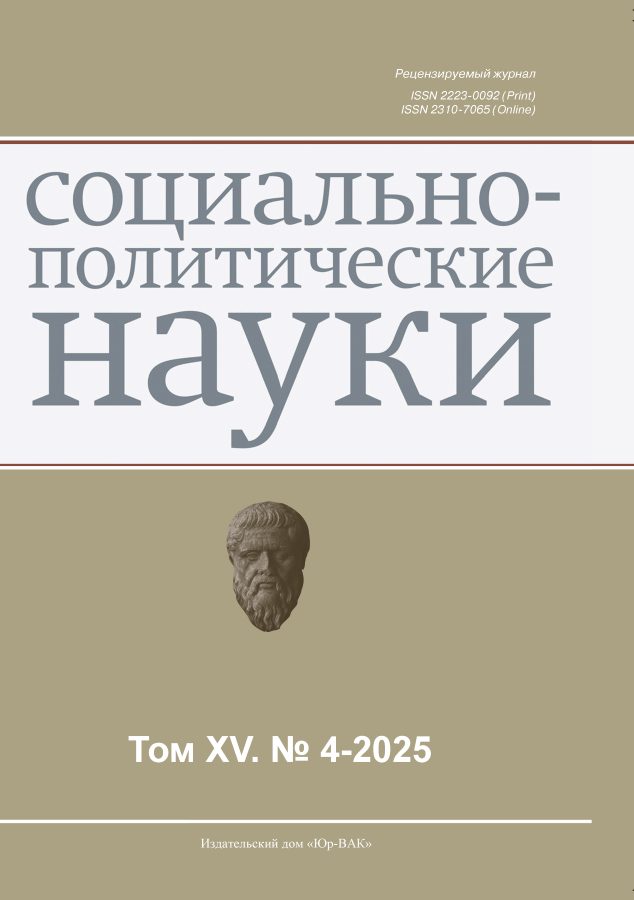The specifics of organizing rehabilitation for disabled people in developed foreign countries in the context of the socioeconomic profile of the Region
- Autores: Sabanov Z.M.1
-
Afiliações:
- North Ossetian State University named after K.L. Khetagurov
- Edição: Volume 15, Nº 4 (2025)
- Páginas: 212-218
- Seção: Economic Sociology
- URL: https://journals.eco-vector.com/2223-0092/article/view/693261
- DOI: https://doi.org/10.33693/2223-0092-2025-15-4-212-218
- EDN: https://elibrary.ru/XIJRZI
- ID: 693261
Citar
Texto integral
Resumo
This article analyzes the specifics of building a rehabilitation system for people with disabilities in the industrially developed countries of the world. The key trends in the formation and functioning of the institution of comprehensive rehabilitation in modern realities are considered, and the main terms and categories that reveal the content of modern methods of social support for people with disabilities abroad are provided. The results of the study show that supporting citizens with disabilities is becoming one of the most important priorities in the social policies of modern countries at the stage of society’s transformation. Addressing the challenges of social integration and supporting people with disabilities is seen as a foundation for promoting sustainable social well-being for the entire population, particularly for those groups that are most vulnerable to social and economic risks. In the context of economic fluctuations and the increasing importance of public health, this area is becoming increasingly significant, as improving health and minimizing the consequences of disability directly impact the quality of life and the duration of active participation in society. Comprehensive rehabilitation, which combines a wide range of medical, social, psychological, labor, and educational measures, is now considered the optimal strategy for restoring and returning people with disabilities to a full life. It can provide individuals who have been affected by illness or injury with the necessary conditions to return to their usual activities, employment, and integration into their communities, families, and society as a whole. A review of current foreign scientific approaches to the rehabilitation of people with disabilities highlights the need for a review and further improvement of the Russian system of medical and social support. The formation of a new model of comprehensive rehabilitation and social protection in Russia, based on an integrative approach, will increase the effectiveness of rehabilitation measures and ensure more effective socialization and inclusion of people with disabilities in public life.
Texto integral
Sobre autores
Zaurbek Sabanov
North Ossetian State University named after K.L. Khetagurov
Autor responsável pela correspondência
Email: sabanovz@mail.ru
Código SPIN: 9767-4154
Cand. Sci. (Sociol.), associate professor, Department of Pedagogical Education
Rússia, Vladikavkaz, Republic of North Ossetia-AlaniaBibliografia
- Aksenova E.I., Gorbatov S.Yu. Rehabilitation services in the world: Trends and key players. Moscow: NIIOZMM DZM, 2021. 59 p.
- Aksenova E.I., Gorbatov S.Yu. Modern technologies and developments in medical rehabilitation, application in the world and in the Russian Federation: Expert review. Moscow: NIIOZMM DZM, 2023. 94 p.
- Grechushkina N.A. Approaches to the rehabilitation of patients with non-infectious diseases: An overview of foreign practices and programs: An expert review. Moscow: NIIOZMM DZM, 2023. 57 p.
- Heindl B., Ramirez L., Joseph L. et al. Hybrid cardiac rehabilitation – the state of the science and the way forward. Prog. Cardiovasc. Dis. 2022. Vol. 70. Pp. 175–182.
- Seijas V., Roxanne M., Mishra S. et al. Rehabilitation in primary care for an ageing population: A secondary analysis from a scoping review of rehabilitation delivery models. BMC Health Services Research. 2024. Vol. 24 (1). P. 123.
Arquivos suplementares









